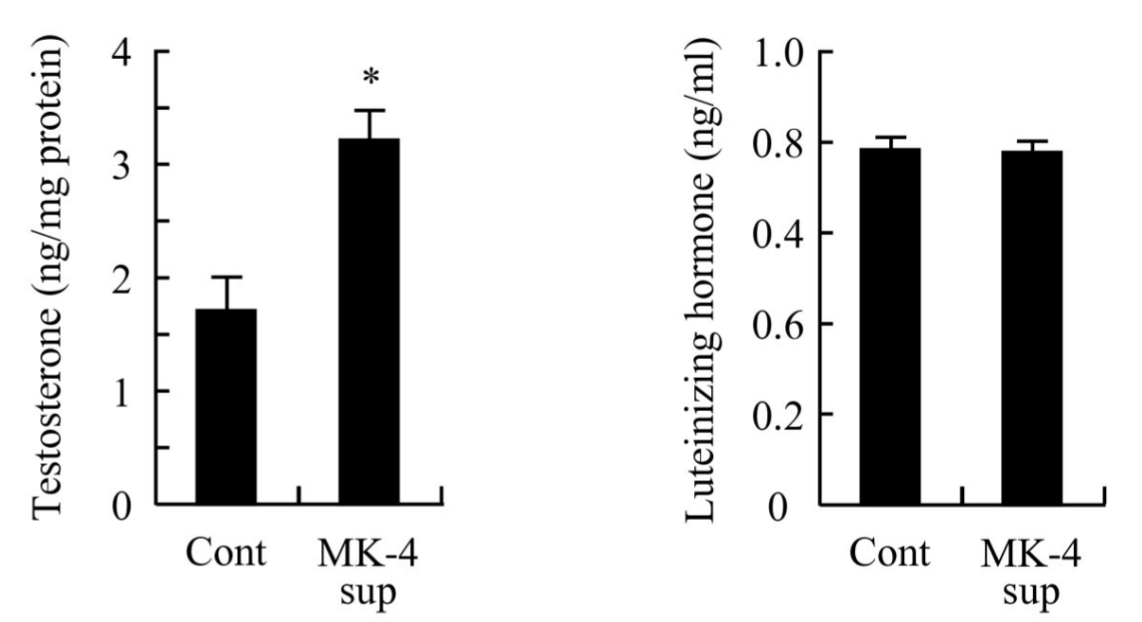Vitamin K builds up in the testes, potentially playing a direct role on T-synthesis (in rats).
![By Calvero. (Selfmade with ChemDraw.) [Public domain], via Wikimedia Commons](https://supplementsinreview.com/wp-content/uploads/2016/08/1200px-Menaquinone.svg_-300x125.png)
- Directly influences T-synthesis. By inhibiting inflammation & upregulating certain genes, vitamin K protects T against bodily “T-killers.”
- Potential interaction with SHBG. Vitamin K increases production of a protein structurally similar to sex hormone-binding globulin, which might have an effect on free T levels.
- Protects prostate gland. Conversely, vitamin K prevents excess T exposure to the prostate by maintaining blood flow surrounding the sex organs.
Overview
Known as the “Forgotten Vitamin” due to its unfortunate lack of recognition, Vitamin K is an essential, fat-soluble vitamin that plays important roles in blood coagulation, bone strength, and, yes, T production. Of the two most common vitamin K forms–phylloquinones (K1) and menaquinones (K2)–the K1 are far more prevalent in the diet, found in green leafy plants, whereas the K2 vitamins, by-products of bacterial fermentation, are harder to come by.1
Which is slightly troubling considering that the K2 forms seem more capable of increasing testosterone.
Because K1 converts to K2 in the body, dietitians largely considered dietary K2 as practically ineffectual and not worth the effort to manufacturer. As research develops on this form of vitamin K, this sentiment seems to be unraveling, with many researchers now believing that K2 might illustrate one of the missing links on T-synthesis that has long gone forgotten.

How Vitamin K Might Help T
Inhibition of T-killing inflammation
In lipopolysaccharide (LPS)-treated rats, T levels tank due to the increased levels of harmful inflammation caused by LPS. Due to vitamin K’s known suppression of inflammation, researchers administered K to LPS-treated rats to observe whether or not K’s anti-inflammatory benefits could protect T-production under these conditions. Lo and behold, K proved successful in resisting T-killing inflammation. Additionally, there seemed to be a noticeable build-up of K in the testis, suggesting that the vitamin might play a direct role in T-synthesis.2
Facilitation of gene regulation in T-synthesis
Under conditions of K-deficiency, there seems to be a down-regulation of the Cyp11a cholesterol side chain cleavage enzyme, a rate-limiting enzyme in the T-synthesis process–in other words, low Cyp11a equals slow rates of T-synthesis. This relationship between K and Cyp11a seems to occur at the genetic level as low concentrations of vitamin K (specifically MK-4) has been shown to decrease genetic expression of the rat genes responsible for coding the Cyp11a enzyme.3
Unknown interaction with SHBG
This bio-mechanism doesn’t outright point to increased free T levels, but it’s interesting nonetheless that vitamin K seems to have a vague interaction with sex hormone-binding globulin (SHBG), the hormone responsible for binding & deactivating free-floating T. How vitamin K does this is through upregulating genetic expression of the Gas6 protein that has some structural similarities to SHBG. As far as we know, this bio-effect might potentially decrease active T levels or have no effect at all–but it’s still worth the investigation considering its relation to sex hormones.4
The “K” is for Koagulation
![See page for author [Public domain or Public domain], via Wikimedia Commons](https://supplementsinreview.com/wp-content/uploads/2016/08/Henrik_Dam_nobel-212x300.jpg)
Calcified veins block blood flow from the testes, occasionally causing over a 130-fold increase of free T near the prostate gland. As a result, the excess concentration of T promotes prostate hyperactivity, potentially leading to severe men’s health issues later in life. Researchers speculate that low K might be part of the problem.5 With that in mind, vitamin K supplementation not only preserves male health by maintaining T levels, but it also maintains T circulation through facilitating calcium absorption in the bones. That’s at least three benefits we counted in the statement.
Research
Animal Research
Most, if not everything, that we understand of vitamin K’s T-boosting potential derives from animal research. And considering the vitamin’s apparent benefits on rat sex hormones, it seems a little odd that more of an effort hasn’t been undertaken to implement K supplementation in human trials.
Regardless, what we’ve learned thus far through animal research seems to suggest that vitamin K plays a direct role on T-synthesis that becomes disrupted during K-deficient conditons:
- One rat study used DNA microarray to identify genes that were seemingly affected in the testis by K-deficiency. The researchers found that “expression of genes involved in the biosynthesis of cholesterol and steroid hormones was decreased in the K-def group.” Ultimately, this lead to a decrease in T-production when compared to control samples.3
Additionally, whereas this study observed a link between low K levels and low T production, another study took it a step further by administering K2 (MK-4, specifically) to non-deficient rats:
- Over the course of 5 weeks, the rats were either administered 75 mg/kg of diet MK-4 or placebo to determine the vitamin’s effects on steroidogenesis. By the end of the study, the researchers found that MK-4 fed rats possessed significantly higher T levels than placebo, leading to the conclusion: “MK-4 may be involved in steroidogenesis in the testis, and its supplementation could reverse the downregulation of testosterone production in elders.”7

Combined, these two studies suggest that not only does K-deficiency inhibit T-production, but K-supplementation might be a viable T-boosting option—even under non-deficient condtions.
Human Research
As of now, there have been no human trials conducted on vitamin K’s relationship with testosterone. Which is a shame considering its demonstrated potential in animal research. The only study we have that might shed a little light on the interaction between K & T in humans is this study on elderly men… which has practically nothing to do with the interaction between K & T in humans.
Circulating T and Vitamin K levels decrease in old age.
We’re grasping at straws here, considering that this study observed nothing that would implicate a relationship between low T & low K levels in older men. In actuality, the study was conducted to determine the indicative & causative factors of late-onset osteopenia (mild bone loss)—which were found to be low levels of vitamin K & vitamin D metabolites by the way. Regardless, what we might take away from this study with regards to K and testosterone in humans is that the researchers observed simultaneous natural depression in both K & testosterone levels in elderly men.8 This doesn’t exactly establish an association between the vitamin & hormone in humans, but it does at the least correspond with the animal findings of low K correlating with low T.
Dosage for Vitamin K
- The recommended adequate intake for K2 is 120 mcg daily9
- The theoretical minimum effective MK-4 dosage for T-boosting is 1500 mcg
- The theoretical upper limit of MK-4 dosaging is 45 mg (45,000 mcg)
- K2 often comes in daily 100 mcg to 150 mcg dosages (125% DV) as a stand-alone supplement
- In T-booster stacks, K2 usually ranges between 18 mcg to 45 mcg dosages
Side Effects
Currently, there have been no reports of toxicity with oral K2 supplements. It is possible to induce cardiovascular related side effects with Vitamin K injections10, however it’s very unlikely that anyone would supplement K2 via IV.
On the whole, phylloquinone and menaquinone are considered relatively safe, with menadione (Vitamin K3) being the toxic form to avoid. In fairly low doses, K3 has been shown to possess high toxicity, resulting in death in a few rat samples.11 Due to this, K3 is widely unavailable for consumption, but to stay on the safe side, we’ll recommend, again, to only supplement K2 vitamin forms.
Available Forms
Technically, there are over thousands of different vitamin K forms, but the ones that are most associated with the term “vitamin K” are the K1 (phylloquinone) and K2 (menaquinone) forms. K1 is found in nearly all leafy green vegetables and is far more prevalent in our diets than K2.
However, K2 is the preferred option for T-boosting and comes in two different popular forms:
- MK-4. The most popular supplement choice, seems to act independently of the vitamin K cycle in the body. The best K2 for T.
- MK-7. For most vitamin K bio-effects, MK-7 is more bioavailable than MK-4 and works within the body’s vitamin K cycle. Some prefer this K2 due to its longer life-span in the body.
Other K2 forms include MK-8 and MK-9 as well, but these are rarely supplemented. Additionally, there’s also the K2 (menadione) form, but this is not supplemented and highly toxic.
Supplements in Review Recommendation
- Vitamin K2 as MK-4, daily 1500 mcg to (possibly) 45 mg dosage
That’s a huge dosage range. Unfortunately, the appropriate dosage for human sex hormones is currently unknown, our only indication being a rat study. Some sources claim that MK-4 dosages as low as 1500 mcg may have an effect, so we recommend starting there before moving up.
MK-7 may work as well. Considering its longer life-span, MK-7 is an appealing K2 choice. Nothing suggests that supplementing MK-7 won’t also aid T status, but we’re officially siding with MK-4 right now since its T-boosting bio-actions have been better demonstrated than MK-7’s.
Research
The dosage was not 75 mg/kg bodyweight as one might assume, but 75 mg/kg diet
From the original paper:
Eight-week-old male Wistar rats were fed a diet supplemented with menaquinone-4 (MK-4, 75 mg/kg diet), one of the predominant K2 vitamins present in the testis, for 5 weeks.
Noted, thank you.